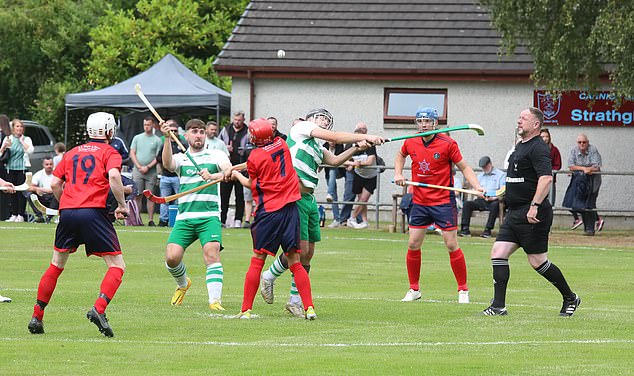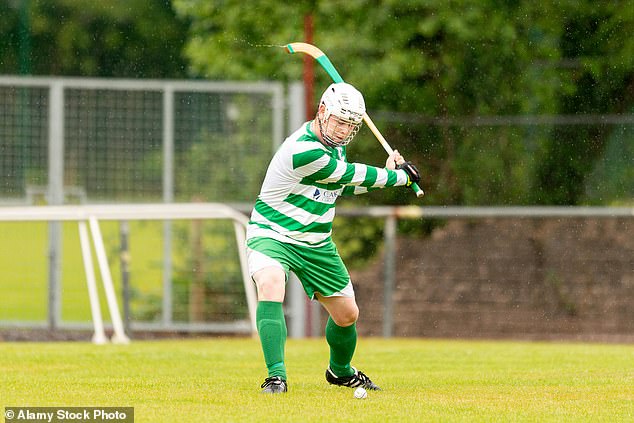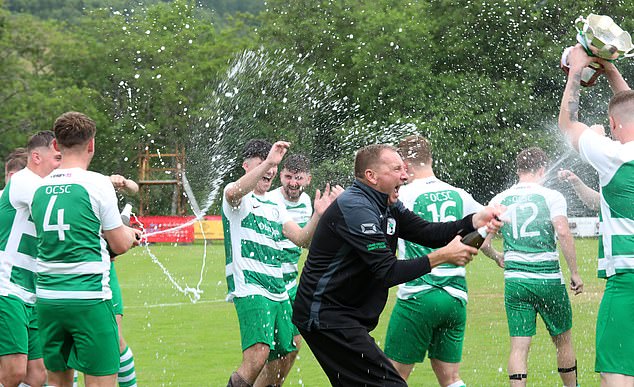There appears to be a gesture towards missing companions. What seems very much like a golf bag is placed on the edge as ObanCelticThe team's players get ready for a championship match.
It keeps our sticks," one player mentions. "Some individuals refer to them as camans, but they have always been sticks in my eyes.
The suitcase is rolled to the Oban Celtic technical zone on the field in the village of Cannich, which is the headquarters of Strathglass Shinty Club.
Nevertheless, two heroes are absent from the final match of the Chieftain’s Cup.
Dougie MacIntyre, one of the team's co-managers, has traveled to Portrush to see his son, Robert, who is deeply devoted to shinty, play around with a golf club.
"Indeed, they have a small golf match going on," says Oban co-manager Cammy MacCallum with a grin. He chuckles at the playful idea that the two should be penalized or suspended for missing the final.



“They would have both been here if Robert had failed to qualify,” he says about the local hero who was competing closely in the Open Championship this weekend.
Numerous Celtic fans, who have journeyed over 100 miles by bus and car to be at the final, think Robert would have participated on Saturday.
He definitely featured in the match at Aberdour last week, substituting to assist Celtic in securing a 2-2 tie. This could be considered one of the most unique lead-ins to the Open.
"Both he and Dougie are eager for updates on the game," says Stephen Campbell, who is assisting with dugout responsibilities.
I recall a time when we were playing and I received a message from Bob inquiring how we were faring. I responded: 'Aren't you participating in a tournament?'
He replied: 'Aye, I'm running late on the tee.'
The attention of the MacIntyres was therefore centered on issues in Northern Ireland. However, it is fair to say that much of their heart remained in the glen in Cannich, where their team — their friends — achieved a win that secured their first senior cup in what a club historian referred to as 'many a year'.
The MacIntyres, keep it quiet, share a notable connection with Oban Camanachd, the local team. Dougie and his brother, Gordon, secured the Camanachd Cup with this team in 1996.
I was on that side as well," says Campbell. "Dougie was an exceptional player, undoubtedly one of the greatest from Oban and I would argue one of the finest the sport has ever seen.
Gordon MacIntyre netted the winning goal in the championship game, just seven weeks following the loss of an eye during a shinty match.
Playing the game was simple for them, but the rest of us had to put in more effort," recalls Campbell about the brothers' abilities. "Bob could have joined them. He has all the qualities—hand-eye coordination, physical strength, and a strong understanding of shinty. He also really enjoys the sport.

Bob's brief involvement with golf caused MacCallum to step away from his off-field coaching responsibilities, assigning them to Campbell, as he positioned himself between another pair of sticks — the goalposts.
Our goalkeeper departed after the previous season, so I've had to take on the role," he says. "I'm 50, so I significantly increase the team's average age.
The group is mainly made up of local young men. "I've known most of these players since primary three," says Campbell. "It's wonderful to watch them improve and reach a final."
David Hamilton, 75, has a more extended connection. "I played with the team in the seventies," he mentions. He notes that boys and girls are now able to participate in six-a-side games at the under-five level.
"It's all about getting them onto the field," he says, then generously gives me a collection of shinty books. He continues to strongly support the sport and organizes the Macaulay Cup, which features the top eight teams in the country.
Today's contest is for teams that only operate one side," says Hamilton. "But it holds a lot of significance for us.
Campbell has one final contribution to offer before stepping back from the field. "They say shinty was a predecessor to golf," he mentions. Well, that was true for a boy on the other side of a body of water.
The past and traditions quietly live together under the clubhouse at Strathglass Shinty Club. It's the day of the final match, vehicles are parked in a field, buses are lined up in a road, and burgers are being grilled on a barbecue.
The deer meat option is eaten eagerly, although there appears to be a restricted interest in the vegetarian alternative. After all, a shinty final is, in essence, a rugged event involving the collision of sticks and players, with a ball traveling distances that would be considered a solid drive shot in Portrush.
The contemporary history of shinty is intriguing, as a corporate overhaul has given it the structure needed to expand the sport. Burton Morrison, president of the Camanachd Association that oversees the game, grew up nearby in Glenurquhart, but his education led him to Aberdeen and his career took him to Glasgow.
The sport is in good condition with more young people participating,' he states. 'We are sending a team of under-17 players to Ireland next week.
He states: 'Bob creates enthusiasm. Shinty is being discussed at the top level of global golf. He remains connected to his origins.'
Roddie MacLennan, the chairperson at Strathglass, was happy to welcome the inaugural final of the Chieftain’s Cup, which was formerly called the Single Team Cup. He highlighted displays that illustrated the development of shinty as an organized sport with established rules.
At the heart of this is the impressive image of Captain Archibald Macra Chisholm, who was chosen as the chief of the first Camanachd Association in 1893. He established the Strathglass Shinty Club in 1879, making it appropriate that the final took place there on Saturday.
The past was also showcased through various elders of the sport. Alan Hill, 88, smiles as he acknowledges he's somewhat of a new arrival to Oban, having moved there in 1943.
I participated in a few matches with Oban Celtic," he mentions. He got involved in the sport when he started as a "message boy" for a Ballachulish mobile shop owner. "We watched numerous games back in the old days.
Hill, who has written an excellent account of sports in Oban, states: 'It created a strong connection with the sport.'
He is accompanied by Ian MacPhee, a young man at 80, who has authored a history of Ballachulish Shinty Club. Both remember Bob’s grandfather, also named Dougie, who was an outstanding shinty player. “He was excellent,” MacPhee says. “He would extend his stick and nothing would get past him.”
Both confirm that shinty is currently managed more effectively, with a board of directors helping to make it a more professional organization. However, they emphasize that shinty will forever be connected to its community origins.
The club holds great significance for the village," says MacPhee from Ballachulish. "During the pandemic, the boys would visit homes to ensure everyone was okay.
Both express concern over the trend of athletes moving from local teams to larger clubs. Celtic and Ballachulish compete in the South Division, which is below the Premiership. Athletes are drawn towards the highest level of competition.
In my time, you played for your local team and that was the extent of it," says MacPhee. "It was a community-based sport with intense competition. But now, athletes can simply move on.
Some individuals also explore different sports. In the case of Bob MacIntyre, he always has a touch of Oban Celtic with him — from Augusta to Portrush and the silver sands at Aberdour.

Posting Komentar